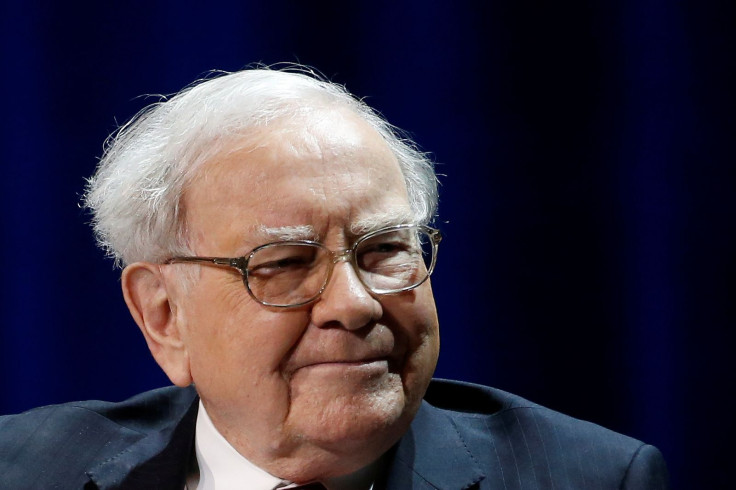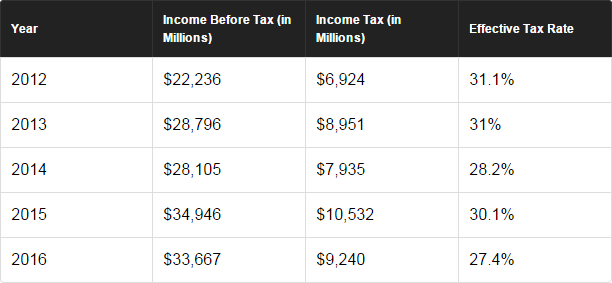How Warren Buffett Can Become Even Richer Under Trump's Corporate Tax Plan

This article originally appeared on the Motley Fool.
One of the cornerstones of President Donald Trump's tax plan is to lower the corporate tax rate to 15% from the current rate of 35%. Congressional Republicans and many experts seem to think 20% is a more realistic target, but either way, there's a possibility of a big reduction in the corporate tax rate in the near future.
• Motley Fool Issues Rare Triple-Buy Alert
Berkshire Hathaway (NYSE:BRK-A) (NYSE:BRK-B), the conglomerate led by Warren Buffett, could be a particularly big beneficiary of a corporate tax rate cut, since the majority of the company's profits are earned domestically. Here's a look at Berkshire Hathaway's recent tax situation and how a 15% or 20% corporate tax rate could impact Berkshire's bottom line.
How much does Berkshire pay in taxes?
As I mentioned, the top federal corporate income tax rate in the U.S. is 35%. Including the average state corporate tax rate, the top overall marginal corporate income tax rate is about 39.1%. A report by the Tax Foundation determined that this is the highest corporate tax rate among the 34 industrialized nations of the world, and is the third highest among all countries, only behind the United Arab Emirates and Chad.
According to Berkshire Hathaway's five most recent annual income statements, here is the amount of income tax the company has paid. Note that this includes Berkshire's federal income tax, as well as any state, local, and foreign taxes that are applicable to the company's earnings.

It's fair to say that on average, Berkshire pays an effective tax rate of roughly 30% of its income.
The reason this is significantly less than the 39.1% top marginal rate I mentioned earlier is that just like with personal income, many business expenses are tax-deductible. For example, insurance premiums, travel expenses, depreciation of business equipment, and fees paid for professional services such as bookkeeping are common corporate tax deductions.
The savings that could come with a 15% or 20% corporate tax rate
At Berkshire's 2017 annual meeting, Warren Buffett said that shareholders would likely benefit from a reduced corporate tax rate, although he did say that in some cases, such as Berkshire's utility businesses, the savings would be passed on to customers instead. And he also said that the benefits would be "very industry- and company-specific," which makes evaluating the overall impact difficult.
• This Stock Could Be Like Buying Amazon in 1997
Based on the numbers in the chart, it does indeed appear that a reduction in the corporate tax rate would translate to billions in additional profit for Berkshire. Assuming that state corporate tax rates don't change, federal tax rates of 15% or 20% would mean average marginal corporate tax rates of 19.1% and 24.1%, respectively.
So, if the top corporate tax rate had been 20%, Berkshire would have saved about $1.1 billion on its 2016 tax bill, before accounting for the company's deductions. A 15% federal tax rate would have translated to $2.8 billion less in taxes, which would be a 11.6% boost to Berkshire's after-tax profits.
It's unclear which corporate deductions would remain and which would be eliminated under any eventual tax reform package, and how much of the benefit would be passed on to Berkshire's utility customers as discussed earlier, but even if corporate deductions were eliminated entirely, this would certainly mean more profits for Berkshire and its shareholders.
One way Berkshire wouldn't benefit as much as other big U.S. corporations
It's important to mention that Berkshire wouldn't benefit from lower corporate taxes as much as many other companies in one very significant way. Specifically, President Trump, as well as many Republicans in Congress, has expressed support for a foreign-profit repatriation holiday at a special one-time rate of 10% or so.
This would certainly help companies such as Apple, which is sitting on a $256.8 billion stockpile of cash, substantially all of which is held overseas. Depending on the actual repatriation tax rate that is ultimately agreed upon, this would likely save the company tens of billions of dollars.
• 7 of 8 People Are Clueless About This Trillion-Dollar Market
On the other hand, Berkshire has a massive $86 billion cash hoard, but virtually all of it is held domestically. So, while Berkshire Hathaway would almost definitely benefit from a lower federal corporate income tax rate, the company wouldn't receive much of a benefit from any repatriation holiday.
Matthew Frankel owns shares of Apple and Berkshire Hathaway (B shares). The Motley Fool owns shares of and recommends Apple and Berkshire Hathaway (B shares). The Motley Fool has a disclosure policy.





















